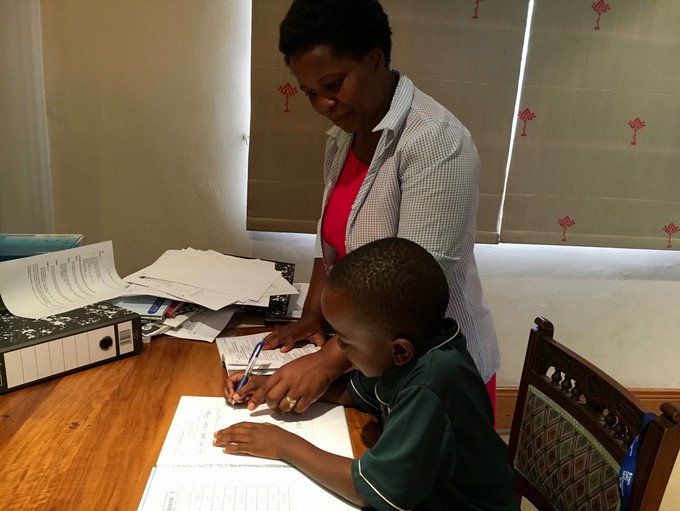Thousands of Gauteng learners still have no school
Province struggles to place large intake of learners
A paperless system launched by the Gauteng Department of Education (GDE) in 2016 prioritised online school admissions, putting parents without internet access at a disadvantage. “You must first find money for data bundles to apply online,” said Johannesburg mother Aggie Zulu. “But then you must also find money to taxi to the district offices, and then they say they will call you, but they don’t.”
Zulu was applying for a fee exemption for her son, Thabo, who started grade one this year. She found the application process stressful last year. “From April [2016], I travelled up and down seven or eight times to the school and then four or five times to the department.”
Gauteng is considered a place of opportunity for work seekers in South Africa. But not only working adults are migrating to the province for its prospects; learners are leaving rural areas for Gauteng’s schools with its higher safety standards, better resources and promising matric results. Some schools in the Tshwane and Johannesburg municipalities are over-capacity. A combination of the new online admissions system and this large intake has left the GDE scrambling to allocate learners to schools across the province. The GDE has now confirmed that at the beginning of this week, two weeks into term, 4,700 learners had not yet been placed.
Gauteng Education MEC Panyaza Lesufi, has asked that schools “admit five additional learners per classroom” in grades one and eight. The GDE has promised 20 new schools and 603 additional classrooms to be built this year to alleviate the pressure on the province’s education system.
The 2016 Gauteng learner intake increased by nearly 4.5% from 2015. In 2016, the GDE reported over 90,000 new learners from outside the province, mostly from Limpopo and the Eastern Cape. A further 12,000 learners entered the Gauteng schooling system from other countries, predominantly Zimbabwe and Lesotho. Gauteng is perceived as one of the best places for education in South Africa.
The number of schools in Gauteng has increased over the past three years but in Limpopo and the Eastern Cape, schools seem to be shutting down. Limpopo lost 58 schools between 2014 and 2016, and the Eastern Cape closed 56 schools in the same period. This is partly due to lack of resources and teachers in rural areas.
Teachers also appear to be leaving rural areas: 2,629 teachers left the Eastern Cape schooling system between 2014 and 2016, and 2,838 teachers left the Limpopo province in the same period.
What these figures mean for the quality of schools in both rural and urban areas is worrying - rural areas are becoming more under-resourced while urban areas become more over-extended.
Zulu is a domestic worker with three children. One of Thabo’s sisters is still at Fairways Primary, the school to which she was applying for Thabo. Zulu said that even though his sister was at the school, he was never guaranteed a spot. “But online they were giving you options for schools that didn’t work, far away on the other side of the highway and my other children are not going there.”
For her daughters, Zulu approached the school directly, and managed to confirm places and fee exemptions for them in person. But with the new system, communications from the district office were different to what was reflected online. Although she managed to apply online in time in early April, Thabo’s admission status was “pending” until December while Zulu heard different things from the school and the district office. The old system of applying to schools in person “was easier, much easier,” Zulu said.
Eventually, Thabo did get accepted at Fairways, but Zulu says that the class sizes are very big. “They are trying to squeeze all the children no matter if the classes are too big. I think it’s difficult for the teachers.” Although she is happy that Thabo got a space and a fee exemption at Fairways, she is worried that she might not have time to help him with his school work if the teacher doesn’t give him enough support in class. Fairways is a small school in northern Johannesburg, and Zulu said that when her oldest daughter left the school five years ago, there were about 20 learners in a class, but that figure has now gone up to above 30.
The main reason for the delay in placing students, according to GDE spokesperson Oupa Bodibe “is the overwhelming demand for spaces where our schools are completely full. We reiterate our deep sense of empathy with the parents whose children are not placed, and commit to accelerate placement.”
Support independent journalism
Donate using Payfast

Don't miss out on the latest news
We respect your privacy, and promise we won't spam you.
Next: No surrogate pregnancies for infertile single parents
Previous: The long day of a rural teacher
© 2017 GroundUp. 
This article is licensed under a Creative Commons Attribution-NoDerivatives 4.0 International License.
You may republish this article, so long as you credit the authors and GroundUp, and do not change the text. Please include a link back to the original article.

